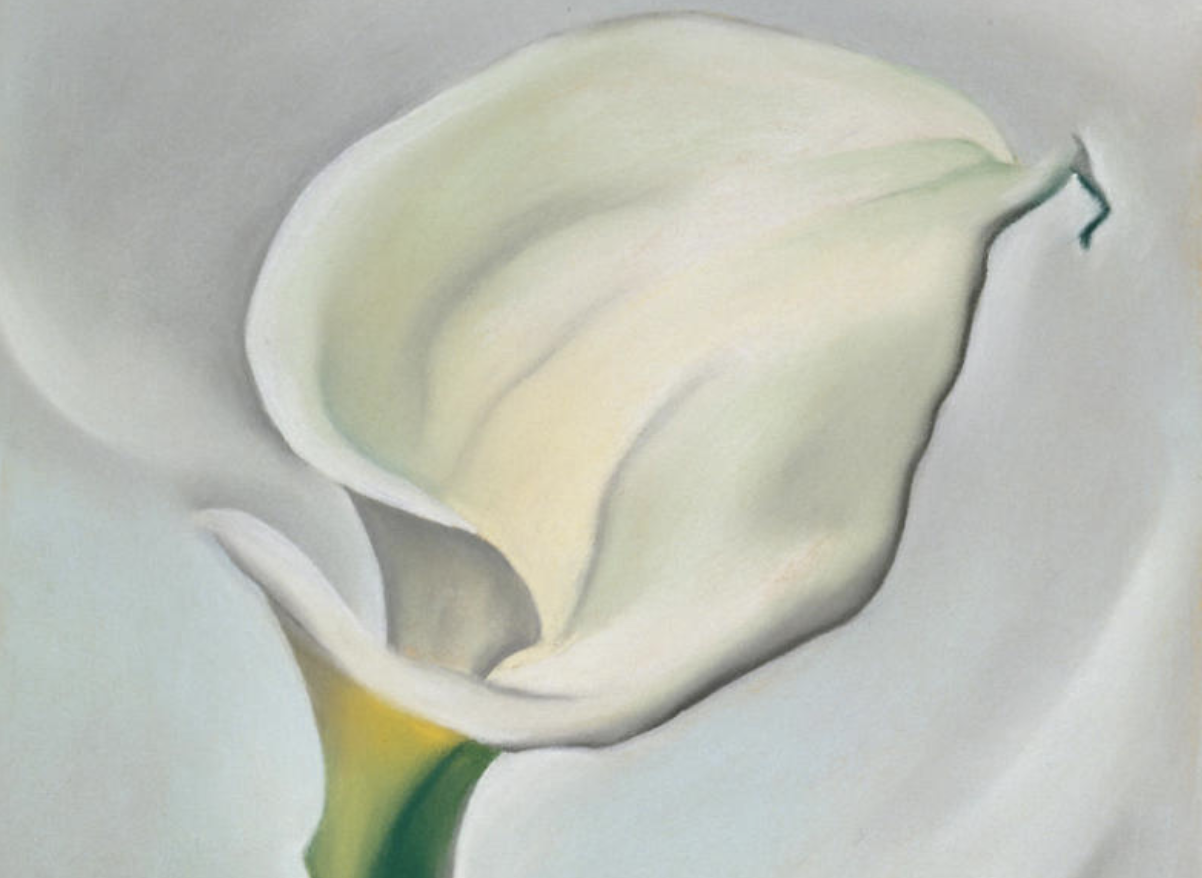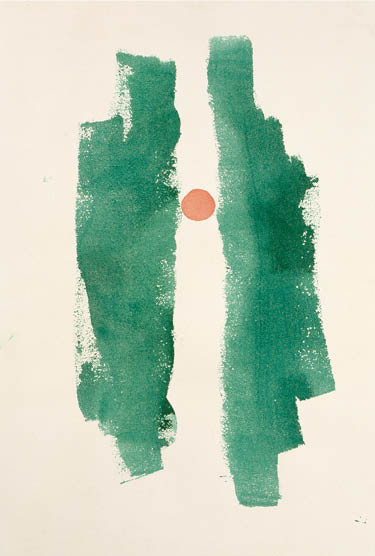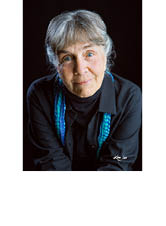Georgia O’Keeffe’s Blindness: An Interview with Carol Merrill
March 16, 2015

Carol Merrill, who knew Georgia O’Keeffe well in the latter years of O’Keeffe’s life, talks to us about two books she’s written based on her experience of getting to know the artist. She also talks to us about O’Keeffe’s loss of sight, which was quite severe by the time Merrill met her.
In 1973, the young writer Carol Merrill wrote a letter of introduction to Georgia O’Keeffe, asking if she might meet her, and the artist, then eighty-six, invited Merrill to visit her at Abiquiu. For the following seven years, Merrill spent most weekends with O’Keeffe, for whom she served as librarian, secretary, cook, nurse, companion, confidante, reader, and caregiver. Though O’Keeffe was still able to function well at that point in her life, she was blind and increasingly frail, which meant that it was important for someone to be with her at all times. In addition, Merrill says, O’Keeffe appreciated the companionship of people who were “so still that it was like being alone.”
Merrill, along with some of O’Keeffe’s other late life companions, gave the artist access to many of the things she had always loved: the books she could no longer read on her own, the food she could no longer cook for herself, the dialogue with other creative spirits that was as important to her at eighty-six as it had been when she was a younger woman. While Juan Hamilton stayed with O’Keeffe during the week, he took weekends off, creating a vacuum that Merrill helped to fill.
Merrill kept a journal of her time with O’Keeffe, which she published in 2010 as Weekends with O’Keeffe. A fascinating book, Weekends is largely a transcription of Merrill’s journal, though punctuated with occasional retrospective musings.
Merrill’s experience with O’Keeffe also informed her 1996 book of poetry, O’Keeffe, Days in a Life.
Interview
A’Dora Phillips: What inspired you to publish your journal, Weekends with O’Keeffe, more than thirty years after having written it and what was your experience of preparing this material for publication?
Carol Merrill: I was inspired to publish my journal because UNM Press editor Beth Hadas advised me to do so. She thought it would succeed, since the poetry book was reprinted a number of times. It seemed better to share the wisdom and information Miss O’Keeffe imparted rather than greedily keep it to myself. The decision to publish was not sudden. It developed slowly over many, many years. The transcription of the journals took about seven years, 20 minutes a day. The changing of the typescript to computer-readable information took another three years.
The process of selecting and editing the poetry took about five years. At one point I nearly burned the manuscripts and journals because it was too private to reveal so much to the world, but after a significant dream of Miss O’Keeffe, I decided to proceed in spite of my initial reservations… The 20-minutes-a-day became a kind of sanctuary from the difficulties that life has thrown my way. There was not a sense of beginning, middle, and end… only process, much of the time.
Phillips: Why did you write to O’Keeffe in the first place?
Merrill: I was alone in the life of my art and wanted to meet her for just a few moments to sense whether I had what it would take to develop my poetry, my writing, in the way she developed her vision and her art.
Phillips: In your introduction to Weekends with O’Keeffe, you quote from the letter you wrote to her in which you ask to see her in order to learn if you “have the strength and power to proceed in [your] work by witnessing [her] will.” Did you answer your question or find out something entirely different from knowing O’Keeffe?
Merrill: Miss O’Keeffe shared with me that many young people would come to her to find out how to be famous, by what secret method. She said for the most part they were boring. She said you have to work hard, in the right direction. There is no secret method. That has stayed with me over the years. Most definitely she changed my way of looking, really looking at things.
Phillips: In Weekends with O’Keeffe, you write: “I forget how blind she [Georgia O’Keeffe] is sometimes. This evening as we sat in the early night air and she couldn’t spot the evening star for a while, I saw how dull her sight is.” Why is it that you could sometimes forget she was blind?
Merrill: Miss O’Keeffe knew her house so well that she moved easily around the space, and she could still see clearly in the periphery of her vision. Her altered vision would become apparent, among other times, when something was out of place in her house.
Phillips: As you understood it when you started working for her, what was Georgia O’Keeffe’s relationship to losing her sight?
Merrill: When I began working for Miss O’Keeffe, I was sworn to secrecy. It was not to be widely known. She focused on things other than her blindness. We decided early on that she could grieve what was lost but make the most of what was left. She could hear, taste, talk, walk with assistance, make pots, write an autobiography by dictating the words… We focused on her ability instead of her disability. Among the staff it was a conspiracy of kindness to focus on what challenged her or gave her pleasure that did not require acute vision.
Phillips: Were you brought on to help compensate for her blindness?
Merrill: Miss O’Keeffe could no longer go into the book room and find a book to look at or read. She could no longer put her book room in order. When I began working with Miss O’Keeffe, it was to list the books in her “book room” library for her estate. She was deciding where to donate them. She needed a list to show people. I would read the list to her. When we finished a shelf, she wanted a string taped across the shelf so she could feel how far we had gotten with this work.
I often sat and read to her for hours after arranging and listing her books to her satisfaction. At first she was going to give some of her books to the McCurdy School, a private school in Española, for the children to use in their library. The rest she considered giving to the UNM [University of New Mexico] general library. However, UNM librarians would have broken up the collection and spread it throughout the library. That was not for her.
Phillips: What were some of her favorite books that you read to her?
Merrill: Miss O’Keeffe read many biographies. She did not like to read fiction because she did not like to read about someone’s insides. One of her favorite books was a Taoist text entitled The Secret of the Golden Flower. I read that to her about four times. It is very difficult to understand, and I have continued to re-read it over the years hoping to understand it better over time.
Phillips: You mention O’Keeffe sometimes looked at things, such as former paintings she had done and a “huge Modigliani in the cliffs.” How would she do so?
Merrill: She would look to the side using her peripheral vision for many things. Since macular degeneration can develop slowly, Miss O’Keeffe had time to accommodate to her blindness. She was always very dignified, never drawing attention to her desire to see, just looking as well as she could, sometimes asking someone else to look and describe to her what was there.
Phillips: You mention in your book that O’Keeffe, “mourns her sight when she can’t make out flowers.” Did she ever talk openly about her loss of sight? If so, what did she say?
Merrill: It was her manner more than her words that showed her feeling about her altered vision.
Phillips: I have the impression from what you’ve written that when you first began working for O’Keeffe in 1973 she was not making art, but that by 1978, she began working again. What kind of artwork did she do in the years you knew her?
Merrill: At some point she was convinced that she could do artwork with apprentices completing her original sketch. She would supervise every step of the process. Masters of the past had done so; therefore, Miss O’Keeffe decided to do so.
In terms of seeing and evaluating her late work, Miss O’Keeffe was able to make it out by gazing at it with her peripheral vision. As I recall, many years later, it seems the sketches were in pencil or charcoal. Miss O’Keeffe never complained to me about her vision. She was very stoic and more committed to adapting to what was going on instead of being a victim. That was her way.
Phillips: Did you ever see her working in her studio or only see afterwards what she might have done there?
Merrill: I painted with her only once, but I left that out of my journal because it might de-value her art if anyone knew I touched her brushes. She complained that my efforts did not “sound” like I was painting. She could hear the brush against canvas and judge the pressure and cadence of the brush strokes.
Phillips: There are a lot of abstract watercolors done by Georgia O’Keeffe in the 1970s. Do you know anything about how these works were done and what O’Keeffe thought about them?

Merrill: One series with the green lines and the red ball was done because she was remembering running away from home toward the sunset on a road lined with tall evergreen trees. There were many variations, but she said they were not an equivalent to the feeling of running away.
Phillips: You mention the photographs Laura Gilpin took of O’Keeffe in the 1970s were “calculated to conceal [O’Keeffe’s] difficulty in seeing.” Why?
Merrill: Perhaps Gilpin as an old friend was respectfully allowing Miss O’Keeffe some privacy about her altered vision.
Phillips: Why was O’Keeffe secretive about her vision loss?
Merrill: Miss O’Keeffe’s former secretary told me that for the sake of the art market they were concealing the fact of her vision loss.
Phillips: When you describe her reaction to an arm injury, I’m left feeling that O’Keeffe did not adapt easily to physical limitation.
Merrill: She did have a temper if she was not employing her prodigious creative energy, so she did things that did not depend on eyes entirely. Juan came up with the idea of teaching her to make a pot. That occupied her for a while. Virginia Robertson, a former secretary, convinced her to write her autobiography, which became her book published by Viking. Some folks were trying to get her involved in planning a museum by visiting sites and thinking how it should be designed. She decided to stop that because museums are for what we are finished with, and she didn’t feel finished yet.
Phillips: Did she ever share a “philosophy” of seeing as it relates to painting?
Merrill: Miss O’Keeffe sometimes reflected on how painters with altered vision might have created whole schools of art.
Phillips: Do you know why she said this, what she was thinking of?
Merrill: What I recall is there was talk about how the Impressionists may have had blurred vision, which made their painting realistic considering their vision.
Phillips: Did she ever talk about what she missed most as a person of low vision?
Merrill: Miss O’Keeffe was very private about her deepest feelings; however, she did ask me to describe again and again what was happening visually with the colors and shadows at Ghost Ranch or the garden at Abiquiu or a particular arrangement of a sculpture and a painting. Such descriptions gave me something for my voice in my efforts in poetry. She did hang different paintings in her studio according to her mood.

Carol Merrill lives in New Mexico, where she has been a teacher and librarian for 30 years. She was born in Tulsa, Oklahoma, in 1946. Merrill has a B.S. from the University of Tulsa and an M.A. from the University of New Mexico. Merrill received the 2010 Zia Award for non-fiction, history/biography from the New Mexico Press Women’s organization. She was awarded the 1994 Witter Bynner Foundation Individual Poet grant. In 1979 Merrill’s play Ever Since Yesterday Evening received a prize from the National Endowment for the Arts.

Comments
Carol: I enjoyed reading this interview. Your poems were a tremendous help in my research for “Georgia O’Keeffe, A Private Friendship.” Do hope you are enjoying good days. Nancy H. Reily
I am pleased that the poems are useful for your research! Carol Merrill